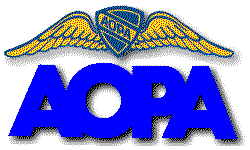When You Wish Upon The Regulations...
 Once every three years, the FAA asks
for public comments on its existing regulations... and the Aircraft
Owners and Pilots Association always jumps at the opportunity to
advance general aviation initiatives. This time around, the
association says it is prodding the FAA to catch up with the
times.
Once every three years, the FAA asks
for public comments on its existing regulations... and the Aircraft
Owners and Pilots Association always jumps at the opportunity to
advance general aviation initiatives. This time around, the
association says it is prodding the FAA to catch up with the
times.
“With the significant changes in technology over the past
three years, the FAA’s regulations need to be updated to
allow pilots to fully utilize the advances,” said Melissa
Rudinger, AOPA vice president of regulatory affairs. “They
also need to take a look at new standards they’ve established
and decide whether older regulations should change.”
AOPA is pressing for three initiatives: Allow a driver’s
license medical for recreational pilots; approve IFR
approach-certified GPS receivers as a sole source of navigation;
and create additional operations test methods for VORs.
Driver’s license medical
For decades, AOPA has been lobbying the FAA to allow pilots who
exercise recreational pilot privileges to fly with a
“driver’s license” medical instead of a third
class medical certificate.
Because the FAA allows sport pilots to fly using a
driver’s license medical and recreational pilots are subject
to similar operational limitations, AOPA believes it’s time
that the agency update its regulations to extend the same
privileges to recreational pilots. Recreational pilots would still
have to assess whether they are medically fit to fly under FAR
61.53.
“Even the FAA, in its sport pilot final rule, said
‘medical conditions are not a significant cause of accidents
in aircraft that are used for sport and recreational
purposes,’” Rudinger wrote.
AOPA points out that, according to the Air Safety
Foundation’s Accident and Incident database, only 1.9 percent
of accidents have any medical factors contributing to the
accidents. Furthermore, the association notes accidents caused by
medical incapacitation were not attributable to conditions that
could have been uncovered or predicted by a medical
examination.
IFR approach-certified GPS receivers
The FAA currently requires pilots flying in instrument
conditions with an IFR approach-certified GPS receiver to have a
backup means of navigation. This would give pilots another means of
navigation in case the GPS receiver loses reliable signals.

“However, with improvements in the GPS satellite signal
and stated assurances from the Department of Transportation that
GPS satellite coverage will continue, the requirement for
redundancy serves more as a requirement and less to ensure the
safety of flight in the event a GPS satellite is providing
incorrect information,” Rudinger explained.
The FAA has already shown its confidence in GPS by approving
stand-alone GPS and RNAV approaches. Now there are more than 4,000
WAAS (Wide Area Augmentation System) and stand-alone GPS approaches
providing access to more than 2,000 airports in the country.
AOPA suggested that a notice to airmen be issued when the GPS
system is compromised instead of requiring a backup.
Additional operational test methods for VORs
More than 25 percent of US-registered aircraft are equipped with
an IFR-certified GPS receiver, and pilots flying these aircraft
should be able to check their VOR against the GPS receiver to
comply with FAR 91.171, which requires a check every 30 days. AOPA
also believes that VOR test periods should be extended to match the
aircraft’s regularly scheduled maintenance interval—a
progressive, 100-hour, or annual inspection.

“Allowing pilots and aircraft operators to test a VOR
against an IFR-certified GPS unit with a current database may
improve the accuracy of the VOR check and may also allow the VOR to
be tested more frequently by pilots,” Rudinger wrote.
“In cases where an aircraft is equipped with one IFR GPS unit
and one VOR, the VOR could be checked on every flight as opposed to
waiting to arrive at an airport with a VOR system test signal or
test point or checking the VOR against a landmark along a VOR
airway while in flight.”
AOPA encouraged the FAA to adopt all of these suggested changes
because they offer pilots the same or even higher level of safety
as the current regulations.
 SpaceX to Launch Inversion RAY Reentry Vehicle in Fall
SpaceX to Launch Inversion RAY Reentry Vehicle in Fall Aero-News: Quote of the Day (04.23.24)
Aero-News: Quote of the Day (04.23.24) Aero-News: Quote of the Day (04.20.24)
Aero-News: Quote of the Day (04.20.24) ANN's Daily Aero-Linx (04.20.24)
ANN's Daily Aero-Linx (04.20.24) Aero-News: Quote of the Day (04.21.24)
Aero-News: Quote of the Day (04.21.24)





